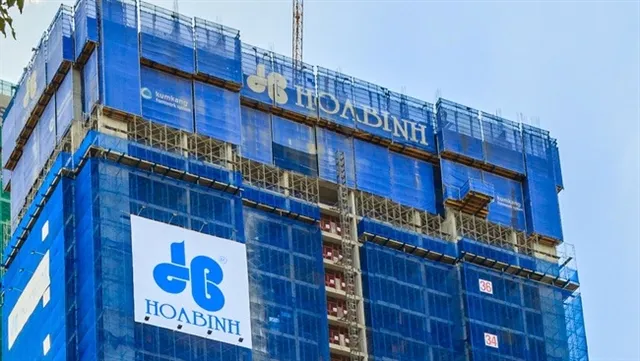
The challenges in the real estate sector have pushed HBC into a precarious position, leading to questions about whether the company might be forced to delist from the Ho Chi Minh City Stock Exchange (HoSE).
Struggles Amid the Real Estate Slump
HBC’s financial struggles began in 2022 when the real estate market entered a prolonged period of stagnation. The company reported a pre-tax loss of VND 2,333 billion in 2022, followed by another loss of VND 1,080 billion in 2023. These consecutive losses have led to a severe depletion of HBC’s equity, casting a shadow over the company’s financial stability.
By the end of the first quarter of 2024, HBC’s equity had plummeted to just VND 149 billion, marking a dramatic 93% decrease. Although the company has managed to reduce its debt levels somewhat, the debt-to-equity ratio remains alarmingly high at 30.1 times, indicating a fragile capital structure that could easily be destabilized by further financial challenges.
One of the primary reasons for HBC's deteriorating financial health is the ongoing difficulties in the real estate market, which have caused a sharp increase in the company’s receivables. As of the end of the first quarter, HBC's receivables stood at VND 10,618 billion. While this represents a 7% decrease, the overall trend has been upward, with no signs of improvement in the near future. Furthermore, the company’s provision for bad debts has doubled compared to the same period in 2023, reaching VND 2,387 billion. Despite efforts to expedite the collection of receivables, the process has been slow, exacerbating HBC's financial woes.
According to Vietcombank Securities Limited Company (VCBS), HBC may need to continue setting aside significant provisions in 2024, as the real estate sector shows no clear signs of recovery. The uncertainty in real estate demand poses ongoing challenges for HBC, especially given the nature of its operations, which involve recording receivables based on construction contract progress—often before investors have accepted and issued sales invoices.
Contesting HoSE’s Delisting Decision
On July 26, HoSE announced its decision to initiate the mandatory delisting of HBC shares, citing the company’s undistributed profit after tax as of the end of 2023. The negative balance of VND 3,240 billion significantly exceeded HBC’s actual contributed charter capital of VND 2,741 billion.
In response to this announcement, HBC swiftly submitted a letter to HoSE, contesting the decision. The company argued against the grounds for delisting on two key points.
First, HBC pointed out that Point e, Clause 1, Article 120 of Decree 155/2020/ND-CP dated December 31, 2020, does not specify whether the accumulated loss condition should be considered based on consolidated audited financial statements or separate audited financial statements. HBC emphasized that no legal document from any competent authority provides clear guidance on the application or interpretation of the law in this situation.
Second, HBC challenged HoSE's reliance on previous precedents to justify the delisting, arguing that it is inconsistent with current law. Previously, HoSE’s Listing Regulations, as stipulated in Decision No. 85/QD-SGDHCM dated March 19, 2018, provided guidance on assessing accumulated losses based on consolidated financial statements. However, on March 31, 2022, the Vietnam Stock Exchange (VNX) issued new Listing and Trading Regulations, which replaced the previous regulations and omitted the specific provisions that HoSE used to justify delisting HBC.
A Path to Recovery?
Given HBC’s fragile financial state, a comprehensive restructuring plan is urgently needed. The company has already begun implementing several strategies to stabilize its financial situation.
The first step involves debt sales. In 2023, HBC successfully sold nearly VND 300 billion in debt to a debt trading company. The company plans to record the sale of remaining debts in the fourth quarter, which is expected to boost equity by about VND 258.7 billion. Additionally, HBC is exploring debt conversion options, with plans to issue 74 million shares at VND 10,000 per share to partners in exchange for debt conversion, to be implemented in 2024.
On June 28, HBC announced the successful issuance of more than 73 million debt conversion shares, which increased its charter capital by VND 730.8 billion. The company also plans to raise VND 2,400 billion through a private placement of 200 million shares at VND 12,000 per share. Furthermore, HBC is considering the sale of construction equipment that has undergone 70% depreciation, which could further bolster equity by VND 400 billion.
VCBS has indicated that if these strategies are successful, the recorded profits could partially offset HBC’s accumulated losses, providing a stronger financial cushion and potentially driving the company’s recovery in the near future. However, VCBS also warns that these measures are only temporary fixes and do not offer a sustainable long-term solution.
In a highly competitive construction industry, investors tend to favor companies with solid financial structures. Therefore, it is crucial for HBC to not only stabilize its finances but also enhance its core business operations. By doing so, the company can restore its corporate reputation, reconnect with major investors, and expand its project portfolio, ultimately securing its place in the market.
As HBC grapples with the possibility of delisting, the company faces a pivotal moment in its history. While the challenges are significant, HBC has laid out a roadmap for recovery that, if executed effectively, could turn the tide in its favor. The question remains: will these efforts be enough to convince HoSE and the market that HBC can overcome its current difficulties and emerge stronger? Only time will tell.




















